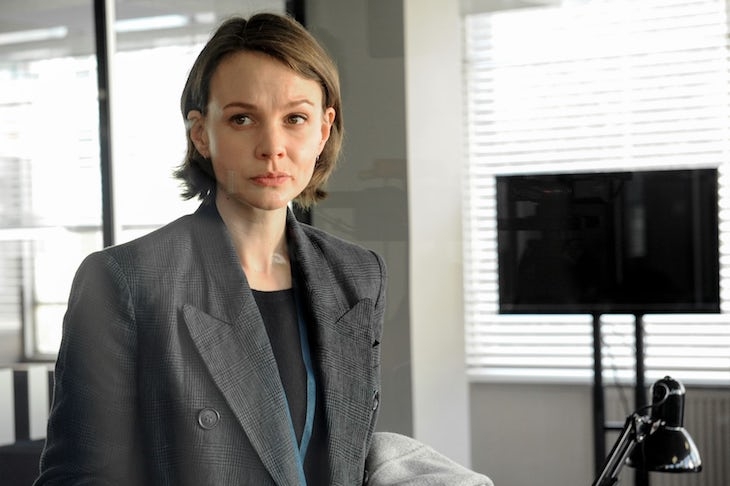Shortly after my rave review of McMafia eight weeks ago, I got a long message from an old friend chastising me for being so horribly wrong. Could I not see that the series was boring, convoluted and badly acted? Was I aware of how many better series there had been on Amazon and Netflix recently because, if I wasn’t, she could give me a few recommendations…
Several other people wrote to me in a similar vein and I felt terrible. Life is short and TV production is so voluminous these days that now more than ever we need critics to sift the bullion from the dross. Sure, reviews are a snap judgment, usually based on just one episode and written under pressure. Even so, if you can’t be trusted to get it right, say, 90 per cent of the time, that makes you a critical fail.
But on this occasion I’d say my friend was wrong and I was right. Yes, I know McMafia lost a good half of its audience during its run: some because they found it too complicated, others because they weren’t gripped or because they were irritated by the way James Norton’s hero remained so opaque (or, as they’d prefer to mischaracterise it, ‘cardboard’) throughout. I, however, stand by my original verdict: McMafia was a must-see artistic triumph.
Because I want save sufficient space to savage the new David Hare detective drama, I’ll give you just one example of the nuance, intelligence and sophistication that made McMafia so special: the baddie, Vadim (Merab Ninidze). Vadim could so easily have just been a malign force of vengeful brutality, with all the interior life of a cat-stroking Bond villain — or, indeed, of Richard Onslow in Le Carré’s The Night Manager. But Vadim was wholly believable and, even at his worst, almost sympathetic. We saw him not just through the eyes of his enemies and torture victims, but those of his adoring daughter, his mother, and his old Afghanistan comrade Ilya (Kirill Pirogov), who stayed loyal to him almost to the very end. And what a masterstroke — major spoiler alert — to have Alex execute him in cold blood in order to inherit his empire and, symbolically, his mantle of lonely watchfulness, ruthlessness and paranoia. Those who didn’t stick it out to the conclusion missed a treat.
Collateral (BBC1, Monday) is billed as ‘a modern-day state of the nation project’ — and therein lies its doom. Screenwriter David Hare is so eager to treat us to his worthy sociopolitical insights on immigration, the gig economy, xenophobia and suchlike that he skimps on the basics. Plot, dialogue, structure, background research, character, dramatic tension, plausibility and verisimilitude, for example.
If this tripe is worth watching for any reason at all, it’s for the insights it offers into the unbearable torturedness of being an artsy-fartsy metropolitan liberal type in Brexit Britain. In fact, it should have been called simply Being Sir David Hare, for that’s all it is: a rehearsal of bien-pensant prejudices shoehorned, with all the subtlety of a medieval morality play, into a half-hearted stab at a detective yarn, turd-polished by a decent budget, some nervy, frenetic camerawork, and an all-star cast led by Carey Mulligan.
The dramatis personae include: a blameless trio of Iraqi immigrants; a likeable, philandering but principled Labour MP and his can-do black female aide; a lesbian vicar and her Vietnamese immigrant girlfriend who just wants a home in Britain, is that too much to ask?; a japesome but brilliant pathologist of Asian extraction; a worldly-wise, cynical but rock-solid black detective; and — the main character — a female detective inspector (Mulligan) at once so unflappable, sensitive, reasonable, intuitive and empathetic it’s a wonder she needs four episodes to solve the crime.
My guess is that the hateful white middle- class people dunit. Well, obviously they did, because as Hare keeps signalling to us with his special writer’s sledgehammer, they’re all just oozing entitlement and prejudice and uncaringness. Toffee-nosed members of the armed forces, especially: they’re clearly up to no good, what with their sexism, racism, jingoism and frankly insane idea that immigrants might pose any kind of a terror threat.
How on earth did such a feeble, meandering script attract a cast in the league of Carey Mulligan, John Simm, Nicola Walker, Billie Piper and Ben Miles? Possibly, it was just the Hare cachet. Probably, though, it was because the right-on politics simply blinded them to its flaws. Same goes for the commissioning editors. Same, probably, for everyone who ever made Hare’s career happen. Was he ever really any good, does anyone know? Or is he the dramatic equivalent of the kind of artists who flourished under Stalin: second-raters with only one real talent — the ability to toe the party line.






Comments